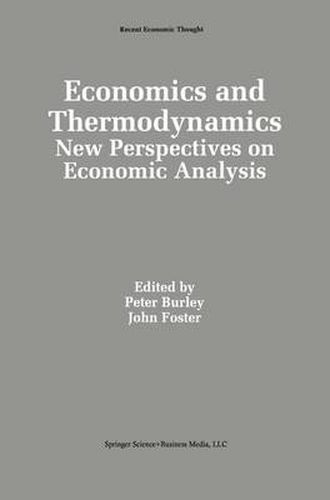Readings Newsletter
Become a Readings Member to make your shopping experience even easier.
Sign in or sign up for free!
You’re not far away from qualifying for FREE standard shipping within Australia
You’ve qualified for FREE standard shipping within Australia
The cart is loading…






This title is printed to order. This book may have been self-published. If so, we cannot guarantee the quality of the content. In the main most books will have gone through the editing process however some may not. We therefore suggest that you be aware of this before ordering this book. If in doubt check either the author or publisher’s details as we are unable to accept any returns unless they are faulty. Please contact us if you have any questions.
This book offers insights into recent research focusing on the interface between thermodynamics and economics. Although nonequilibrium thermodynamics and self-organisation appear to offer more exciting possibilities for economic application, the early papers in the volume demonstrate that economic insights are still derivable from the standpoint of classical thermodynamics. In particular, the analytical framework set out decades ago by John von Neumann is shown to be a particularly rich source of insights and new perspectives. The book attempts both to promote and critically evaluate the application of nonequilibrium thermodynamics of economics. The latter part of the book stresses that there are aspects of socioeconomic systems which we cannot understand using only the thermodynamic analogy, although thermodynamic metaphors can still offer us inspiration in formulating unique characterisations of economic complexity and organisation. The emerging fields of artificial life simulation and the mathematics of nonlinear dynamics also have a role to play in the paradigmatic shift which is now found in economics. Furthermore, it has to be acknowledged that a great deal of economic wisdom currently contained in orthodox economic thought will be of continued relevance and, indeed, may constitute much of the distinctiveness of self-organisational processes in the domain of economic analysis.
$9.00 standard shipping within Australia
FREE standard shipping within Australia for orders over $100.00
Express & International shipping calculated at checkout
This title is printed to order. This book may have been self-published. If so, we cannot guarantee the quality of the content. In the main most books will have gone through the editing process however some may not. We therefore suggest that you be aware of this before ordering this book. If in doubt check either the author or publisher’s details as we are unable to accept any returns unless they are faulty. Please contact us if you have any questions.
This book offers insights into recent research focusing on the interface between thermodynamics and economics. Although nonequilibrium thermodynamics and self-organisation appear to offer more exciting possibilities for economic application, the early papers in the volume demonstrate that economic insights are still derivable from the standpoint of classical thermodynamics. In particular, the analytical framework set out decades ago by John von Neumann is shown to be a particularly rich source of insights and new perspectives. The book attempts both to promote and critically evaluate the application of nonequilibrium thermodynamics of economics. The latter part of the book stresses that there are aspects of socioeconomic systems which we cannot understand using only the thermodynamic analogy, although thermodynamic metaphors can still offer us inspiration in formulating unique characterisations of economic complexity and organisation. The emerging fields of artificial life simulation and the mathematics of nonlinear dynamics also have a role to play in the paradigmatic shift which is now found in economics. Furthermore, it has to be acknowledged that a great deal of economic wisdom currently contained in orthodox economic thought will be of continued relevance and, indeed, may constitute much of the distinctiveness of self-organisational processes in the domain of economic analysis.